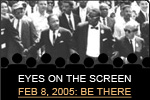 Stranded in copyright limbo, the landmark civil rights documentary Eyes on the Prize cannot currently be released on DVD or broadcast on television. But music activism group Downhill Battle has recently taken matters into its own hands by digitizing the 14-part series and making it available for peer-to-peer distribution. In addition, they’ve launched the Eyes on the Screen initiative to help communities coordinate local screenings of the film in time for Black History Month.
Stranded in copyright limbo, the landmark civil rights documentary Eyes on the Prize cannot currently be released on DVD or broadcast on television. But music activism group Downhill Battle has recently taken matters into its own hands by digitizing the 14-part series and making it available for peer-to-peer distribution. In addition, they’ve launched the Eyes on the Screen initiative to help communities coordinate local screenings of the film in time for Black History Month.
This could go down in history as an important skirmish in the copyright wars – when the public began to act in blatant defiance of the copyright gatekeepers. Rarely have the absurdities of the modern intellectual property system been cast in such stark relief.
But the brave souls at Downhill Battle are wrong to call this act of civil disobedience “fair use” (see Wired article). Few would argue that taking a 14-part film, not in the public domain, and slapping it on public access television is fair use. The big battles over what is and isn’t fair use are yet to come, and they will be crucial in defining the parameters of scholarly and artistic production in the digital era. Let’s not give ammunition to those who would further tighten the screws by blurring the distinction between acts of protest and legitemate fair use. The Eyes on the Prize case is about the public interest plain and simple. About protesting a system that allows public treasures to languish in forced obscurity.
if:book
A Project of the Institute for the Future of the Book
